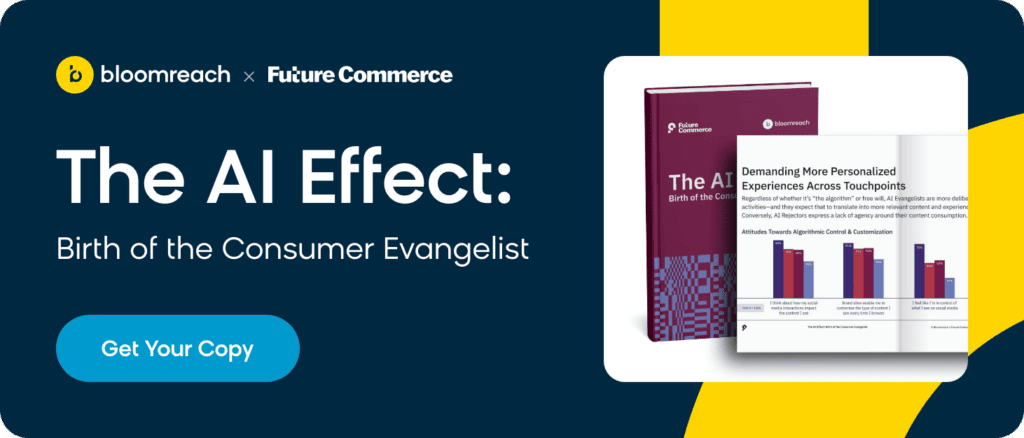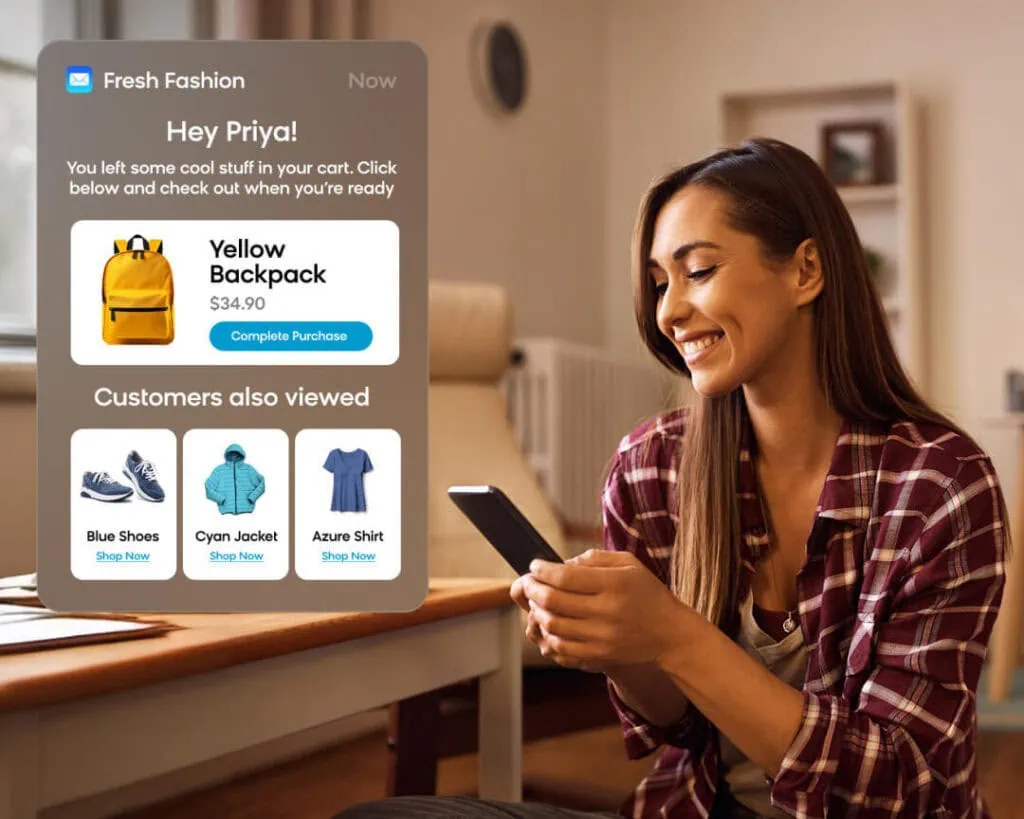Marketers know there’s often a gap between what consumers say and what they might actually do. That’s why analytics is key — it shows the real behavior behind the data, helping brands make smarter, more informed decisions.
And as new technologies emerge, consumer expectations shift just as quickly. Take Amazon Prime, for example. When it launched, fast, free shipping was a game-changer. But what was once revolutionary is now expected from most online retailers. What used to be a perk has become the standard.
AI is the next big shift. It’s already changing how brands interact with consumers, even if shoppers don’t always realize it. From personalized product recommendations to efficient customer service, AI makes experiences smoother, faster, and more tailored.
Brands that leverage AI in their marketing solutions can deliver what consumers want before they even ask. To better understand how AI is shaping online shopping, Future Commerce and Bloomreach surveyed over 1,000 shoppers and compiled the findings in a new report — The AI Effect: Birth of the Consumer Evangelist.
In this post, we’ll highlight key findings from the report and explore how you can use AI to create stronger customer relationships, boost satisfaction, and stay competitive in today’s rapidly evolving landscape.
First, Understanding the AI Adoption Consumer Segments
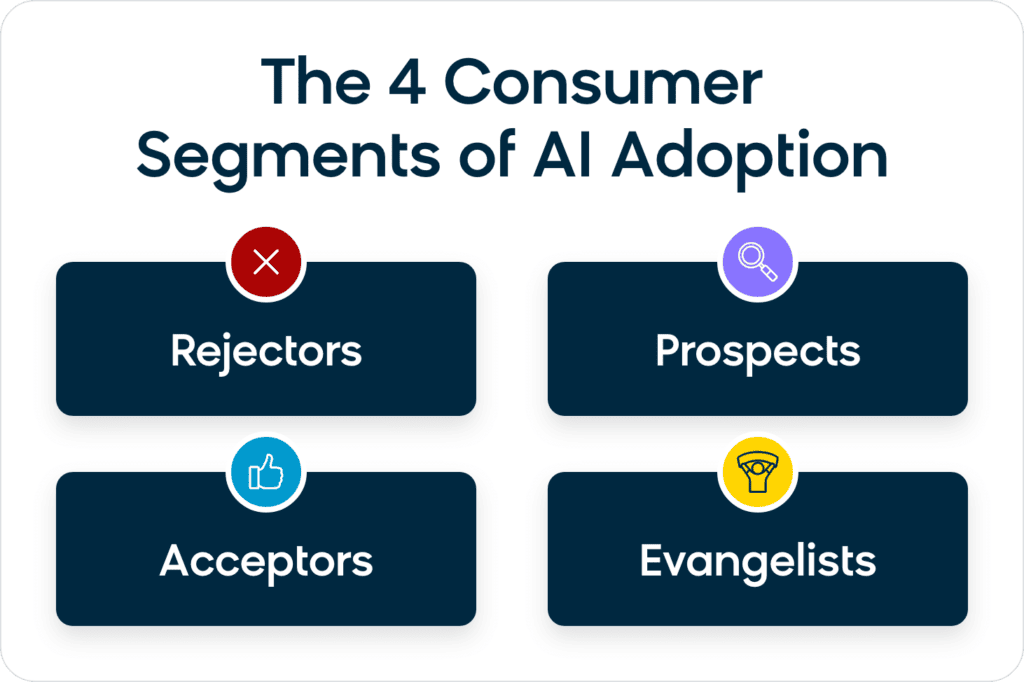
As AI technology continues to shape the retail landscape, it helps to understand consumer attitudes toward its adoption so you can create effective marketing campaigns:
- The rejectors: This segment consists of consumers who have not used AI in their shopping journeys and are resistant to its adoption. Rejectors typically have a negative outlook on AI, often driven by concerns over privacy, skepticism about its effectiveness, or simply a preference for traditional shopping methods.
- The prospects: Prospects are consumers who have not yet utilized AI in their shopping journeys but are open to it. They possess a positive outlook on AI and are curious about its potential benefits.
- The acceptors: Acceptors use AI in their shopping journey but may not fully recognize its potential or benefits. While they maintain a positive outlook on AI, they don’t feel as empowered by it as the evangelists (see below) do. They appreciate AI’s role in making their shopping experience easier but may still rely on traditional methods alongside AI-driven features.
- The evangelists: This group actively uses AI in their shopping journeys and embraces its capabilities wholeheartedly. They feel empowered by AI, viewing it as a valuable tool that enhances their shopping experiences. These consumers will likely advocate for AI-driven solutions, sharing their positive experiences with others and seeking out brands that leverage AI effectively.
Shoppers Want Shopping To Be Seamless
As online shopping becomes more common, consumers expect a seamless and effortless experience. This is where AI makes a real difference. It simplifies choices, reduces decision fatigue, and makes shopping more accessible.
With AI, the shopping journey becomes quicker and more enjoyable:
- 91% of shoppers say AI helps them navigate countless options, making it less overwhelming.
- 87% of consumers feel more confident when they see “AI-powered” in searches because it indicates they will receive personalized recommendations that match their preferences.
- 1 in 10 consumers now prefers using conversational AI tools like ChatGPT instead of traditional search engines like Google.
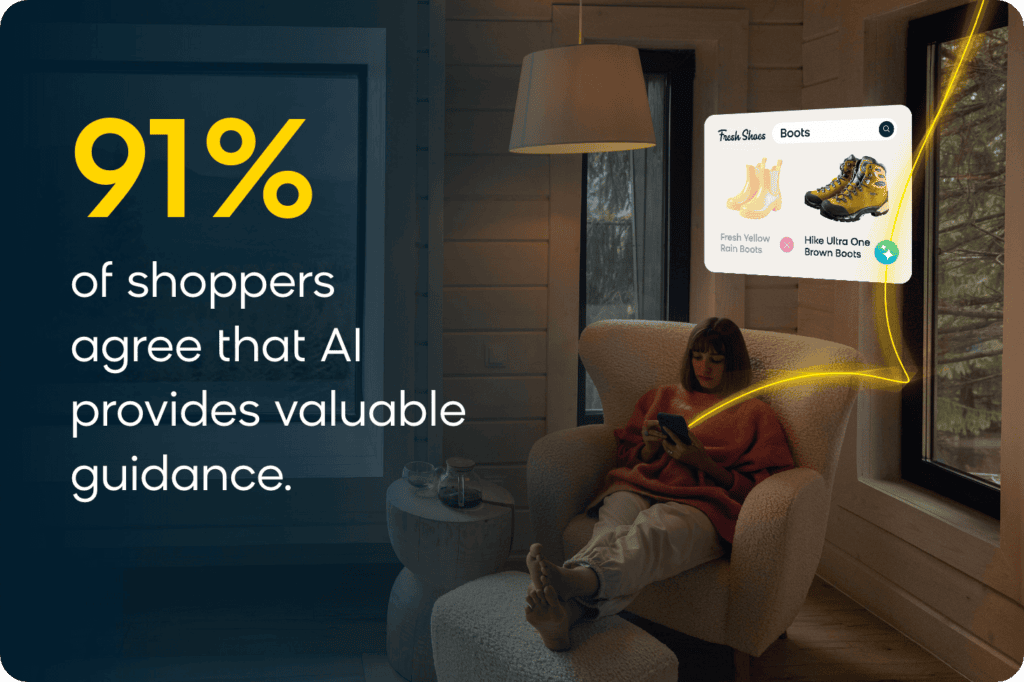
These insights reveal a clear shift in how shoppers approach product discovery. It also indicates a growing desire for more interactive and personalized assistance during the shopping process. Brands can adapt their strategies to offer more tailored interactions that resonate with shoppers.
AI Can Improve the Shopping Experience
Anyone who has stepped into a physical store lately knows it can feel more like a chore than an enjoyable outing. Staff shortages, limited product selections, and heightened security measures have transformed what used to be a fun experience into a frustrating task. In-store shopping now requires considerable time and effort, and many shoppers often leave empty-handed.
In contrast, AI can potentially improve the shopping experience, making it more efficient and enjoyable. Technologies like generative AI (GenAI) and large language models (LLMs) enhance ecommerce search capabilities, allowing for more interactive and personalized shopping experiences from the comfort of one’s home.
These AI-driven tools facilitate real-time conversations about customer preferences, turning shopping into a more engaging experience. AI can help your brand reconnect with customers in a way that brings back the joy of shopping lost over the years.
AI can also help by automating routine tasks, freeing you to focus on more important things like creativity and strategy. By leveraging AI to analyze vast data sets, you can deliver personalized recommendations and timely offers that strengthen customer relationships.
Consumers are also recognizing how AI significantly enhances their shopping experience:
- 87% of shoppers believe that AI will simplify their search for products, helping them navigate choices without the hassle of filtering through endless options
- 78% of consumers feel that AI will enhance their overall shopping experience, making it more enjoyable and less stressful.
- 1 in 5 consumers prefer brands that integrate AI into their user experience, highlighting the demand for personalized interactions that resonate with their needs.
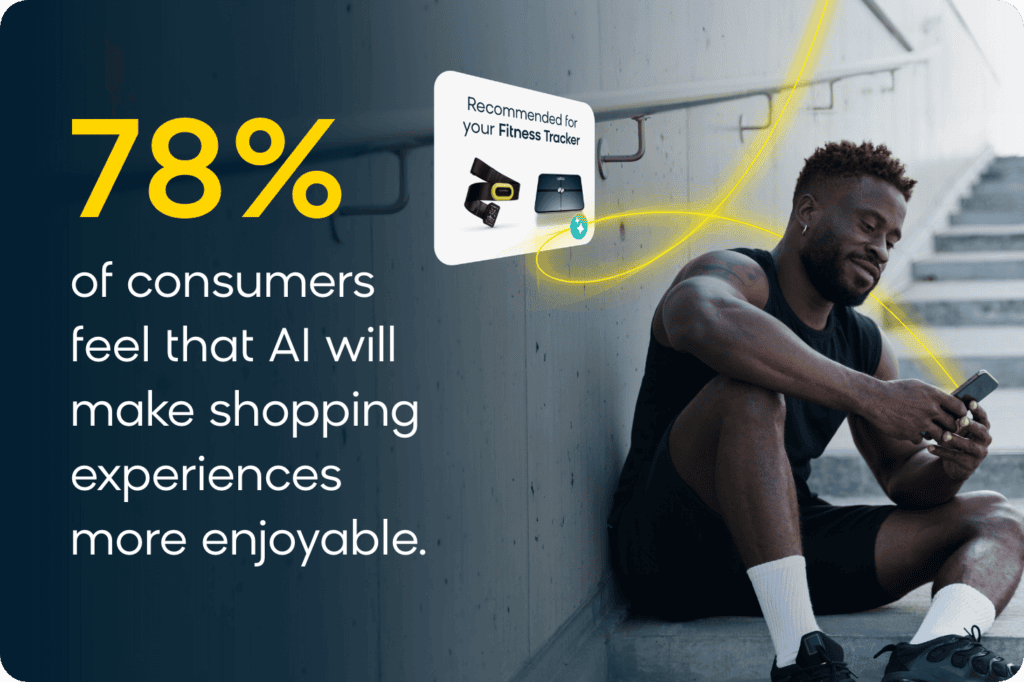
Consumers Want AI-Powered Personalization
When browsing online, shoppers want brands to know who they are and what they like based on their search, browsing, and purchase history.
According to the report, 78% of AI evangelists, 54% of acceptors, 48% of prospects, and even 28% of rejectors believe brands should provide personalized experiences tailored to their preferences.
AI-powered personalization has the potential to revolutionize the shopping experience by moving beyond basic recommendations. By analyzing extensive customer data — such as demographics, browsing habits, and purchase history — AI can identify patterns that inform hyper-targeted suggestions.
This level of personalization isn’t just nice to have. It’s essential for creating meaningful connections with your customers. Personalized recommendations demonstrate that your brand understands each shopper’s unique preferences and genuinely cares about enhancing their experience. This understanding fosters trust and loyalty, encouraging your customers to return for future purchases.
AI recommendations can also significantly streamline the shopping journey. With countless options available online, consumers often feel overwhelmed. AI allows your shoppers to navigate their choices more effortlessly by curating relevant product selections based on their behaviors and preferences. This saves time and makes the shopping experience more enjoyable and satisfying.
Don’t Neglect the AI Effect
As consumer perceptions and expectations around AI continue to evolve, it’s clear that shoppers are increasingly looking for brands that deliver personalized and seamless experiences. This trend toward greater adoption of AI technology is not going away. Many brands are exploring AI solutions that align with these expectations to keep up.
By embracing AI-powered personalization, you can create meaningful connections with your customers and stand out in a competitive marketplace.
If you’re interested in learning more about how AI is shaping the future of shopping, check out the full report. It offers valuable insights that can help you navigate this rapidly changing landscape and better understand what your customers are looking for. Download the report here.
